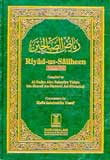Riyad Us-Saliheen (Gardens of the Righteous)

Chapter 195
The Excellence of Optional Prayers (Sunnah Mu'akkadah) along with the Obligatory Prayers
1097. Umm Habibah (May Allah be pleased with her) the Mother of the Believers reported: I heard the Messenger of Allah (PBUH) saying, "A house will be built in Jannah for every Muslim who offers twelve Rak`ah of optional Salat other than the obligatory Salat in a day and a night (to seek the Pleasure of Allah).''
[Muslim].
Commentary: Tatawwu` means to offer more Nawafil (optional prayers) on one's own after performing the Faraid (obligatory prayers). Thus, this Hadith tells us the merits of optional prayers and holds promise of (Jannah) for those who make it a practice.
1098. Ibn `Umar (May Allah be pleased with them) reported: I performed along with the Messenger of Allah (PBUH) two Rak`ah of optional prayers before Zuhr and two after the Zuhr (noon prayer), and two after the Friday prayer, and two after the Maghrib (evening) prayer, and two after the `Isha' (night) prayer.''
[Al-Bukhari and Muslim].
Commentary: There are two kinds of Nawafil which are performed before or after the obligatory prayer. Firstly, the one which were performed by the Prophet (PBUH) more frequently. According to the present Hadith, their total comes to ten Rak`ah while in other Ahadith their total is twelve or fourteen Rak`ah. They are called Sunnah Mu'akkadah or As-Sunnan Ar-Rawatib That is, the Rak`ah which are proved from the saying and practice of the Prophet (PBUH) and which were performed by him usually. These are said to be Compulsory prayers. Secondly, such Nawafil which were not performed by the Prophet (PBUH) regularly. These are called Sunnah Ghair Mu'akkadah and are said to be Optional prayers. In any case, Nawafil have great importance in creating a special link between the worshipper and Allah, and for this reason the believers do not neglect them. But their status in Shari`ah is of Nawafil the performing of which is rewarding and omission of which is not sinful. One thing that should be borne in mind in respect of As-Sunnan Ar-Rawatib or Mu'akkadah is that it is better to perform them at home. This was the usual practice of the Prophet (PBUH), and this is what he ordained the Muslims.
1099.`Abdullah bin Mughaffal (May Allah be pleased with him) reported: The Messenger of Allah (PBUH) said, "There is a Salat (prayer) between every Adhan and Iqamah; there is a Salat between every Adhan and Iqamah.'' (While saying the same for the) third time (he (PBUH) added), "It is for him who desires (to perform it).''
[Al-Bukhari and Muslim].
Commentary: The two Adhan here means Adhan and Iqamah, as has been elucidated by Imam An-Nawawi. That is, offering of two Rak`ah between Adhan and Iqamah is Mustahabb (desirable). It comes in the category of Ghair Ratiba or Ghair Mu'akkadah Nawafil. These Nawafil can be performed after the Adhan of every Salat before the congregation stands for the obligatory Salat.
